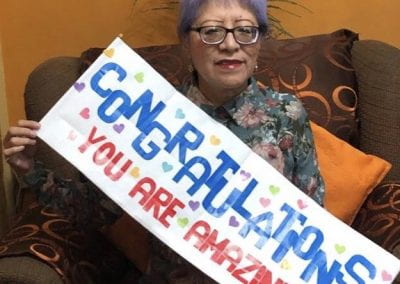Transforming Health
FOR A BETTER WORLD
Department of Global Health Annual Report 2020
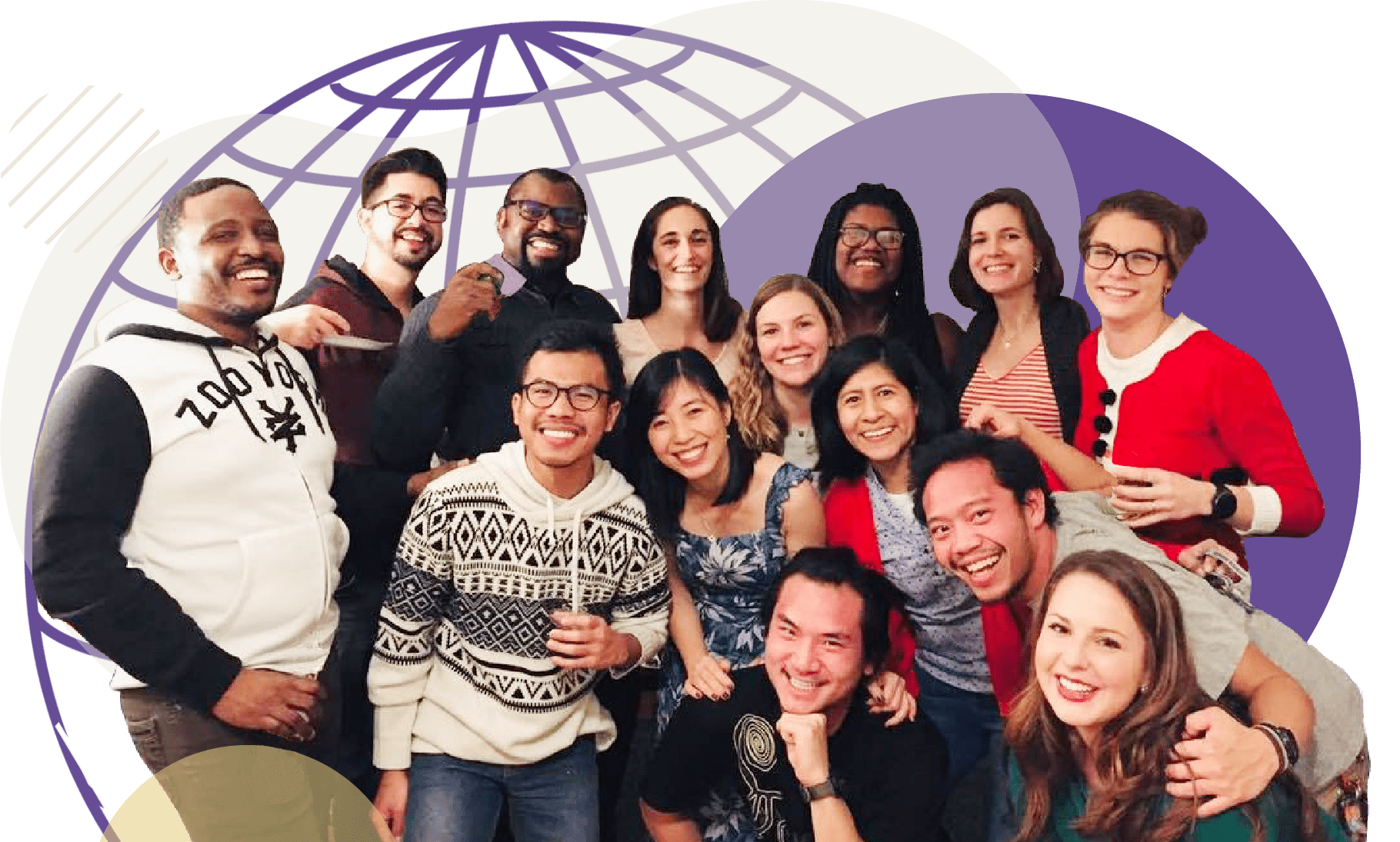

LETTER FROM THE CHAIR
It has been a year since the COVID-19 pandemic really enveloped and reshaped our daily lives. I have never lived through a year as devastating, exhausting and filled with frightening uncertainty for my whole community, my country and the world. The disproportionate impact on those who are most vulnerable compounded the pain and frustration.
At the same time, this has been a time that has thrown into relief the strengths and contributions of so many in DGH and in Global Health more broadly. We were at the forefront in sounding the alarm about the pandemic with the UW-wide forum in UW’s Kane Hall about the emergence of COVID-19 in February 2020. DGH faculty, staff and students have consistently played leading roles in every aspect of pandemic response, from defining the pathogenesis of SARS CoV-2 and the epidemiology of COVID-19, through daily literature reviews and evaluation of non-pharmaceutical interventions like mask use, to development, testing and/or delivery of tests, drugs and, most recently, vaccines. Many DGH faculty leveraged experience and expertise in HIV prevention and care to help guide and implement COVID responses.
Read More
This has also been a year of discovery and creativity. The breadth, scale and speed of global collaborations were unheard of. And we figured out new ways to do many things – like providing medical care via telemedicine, having small meetings and large conferences via Zoom and other platforms, and teaching courses remotely. Many of these changes are long overdue and have co-benefits like improving access and reducing carbon emissions. Most – including teaching and learning remotely – require major time commitments to learn new approaches and support to facilitate the transition to these formats.
I am very hopeful about the coming months. There is a long road ahead to full recovery, but with vaccines available and more on the way, as well as advances in prevention and treatment, it is likely that we will turn the corner on this pandemic soon if we continue to accelerate vaccination rates here and globally, and simultaneously continue to follow public health guidance about things like mask use, physical distancing, and avoiding high risk activities and venues.
My thanks to each of you for all you have done over the past year and all you are continuing to do to help each other, our community and our global partners emerge and recover from the pandemic.
Global health By The Numbers 2020
Centers, Programs & Initiatives
Around the World
Through innovative research, capacity development and education and training, our Centers, Programs and Initiatives are making bold contributions toward addressing global health’s most urgent priorities.

Million Dollars
From Grants & Contracts
2nd largest UW department in grant funding
885 Projects in 148 Countries
See the Projects
faculty
81 Primary or joint in DGH
352 Primary appointments with other UW departments or primary employment at affiliated institutions
13 Emeritus faculty
total matriculated students

Alumni
Our Alumni have gone on to work in organizations including:
National Ministries of Health
Local organizations worldwide
World Health Organization (WHO)
United Nations Programme on HIV/AIDS (UNAIDS)
Centers for Disease Control and Prevention (CDC)
Bill and Melinda Gates Foundation
PATH
Partners in Health

Staff
226 USA-based
3162 Internationally based with International Training & Education Center for Health (I-TECH), International Clinical Research Center (ICRC), Health Alliance International (HAI), UW Kenya (Includes staff working with DGH through other organizations, in-country offices, and training stipends.)
E-Learning Students
2020
publications
in peer-reviewed journals in 2020
Commitment to Diversity, Equity and Inclusion
Social justice and equity are core values of DGH and are the cornerstone of universal health and wellbeing. Events in the past academic year have demonstrated how important it is to commit actively to social justice and anti-racism, given clear evidence of systemic racism, police brutality and injustice in our society and the disproportionate impact of COVID-19 on Black people and other people of color.
Recognizing the opportunity and obligation to recommit to working to end structural racism in our own Department, DGH is taking steps to come together in collective and individual action to radically change the system that has perpetuated the long history of racism and injustice that threatens our community and our work, including the creation of a DGH Diversity, Equity and Inclusion Committee that has been active since 2013.
In 2020 DGH developed and began implementing an Action Plan to Address Racism and White Supremacy. The Plan outlines specific actions that the department will take to fight racism within our institution, as part of our DEI goals. These actions were developed jointly by the DGH leadership team and the DGH DEI Committee, with input from DGH students, faculty and staff. DGH is currently undertaking a strategic planning process to develop DGH’s 2022-24 Strategic Plan in which DEI goals are central to every aspect of DGH’s work.
Below: In June, DGH leadership, faculty, staff and students joined thousands of health care workers in Seattle to march against racism and police brutality.
Research
Our research and capacity development programs and projects focus on developing, testing and delivering successful interventions that result in improved health, at scale, among vulnerable people and communities most at risk for adverse health outcomes: children, adolescents, women, and people in low- and middle-income settings around the world, including in Seattle and across Washington State. These highlights from 2020 offer a glimpse of our achievements that are harnessing expertise and innovation across the entire university—and across the globe—to improve health and reduce health disparities.
Pandemic Preparedness: COVID-19 Research and Action
Climate and health
Each year, The Lancet Countdown tracks more than 40 indicators on links between health and climate change. This year presents the most worrisome outlook to date as key trends worsen. The latest report finds that, with climate action, the lives of millions could be improved and saved.
Examining how climate change, air quality, and COVID-19 worsen racial health inequities for Black, Indigenous, and people of color, the U.S. Brief makes clear that these challenges can’t be treated in isolation. Report authors advocate for a holistic response to these converging crises. They stress that integrated solutions can deliver better public health, a sustainable economy, environmental protection and a more equitable society. Jeremy Hess, Professor, DGH, is a senior author on the U.S. brief and one of the authors of the global report.
Global Mental health
Mental Health Treatment Approach Shows Promising Results in Mozambique
Dr. Bradley Wagenaar and colleagues at Health Alliance International collaborated with I-TECH Mozambique’s HRSA-funded HIV program to pilot test the integration of the Common Elements Treatment Approach (CETA) into public HIV Care in Beira City, Sofala, Mozambique. Preliminary findings revealed a high prevalence of mental distress and suicidal ideation. After four sessions of CETA, mental health symptoms decreased by 50%, suicidal ideation decreased 100%, and CETA patients had 9% higher one-month retention and 19% higher three-month retention in HIV care compared to all HIV-positive patients.
Read More
Equipping Community Health Volunteers
The WHO Ensuring Quality in Psychological Support (EQUIP) project trained 18 community health volunteers in brief psychosocial therapy. The study looked at how to deliver competency based training, and UW’s Global Mental Health program was one of seven sites selected by WHO for the project. 2020 posed massive challenges but the project was successfully completed through virtual training and care delivery. A large part of the project involved capacity development for Nairobi psychologists and collaboration with Nairobi County and citiesRISE.
M-healer
Together with Professor Angela Ofori-Atta and colleagues at the University of Ghana, Professor Dror Ben-Zeev (Psychiatry), Professor Pamela Collins (DGH and Psychiatry) and Professor Jaime Snyder (I-School) worked to develop a digital toolkit, M-healer, designed to support dissemination of evidence-based psychosocial interventions and strengthening of human rights awareness and knowledge among faith healers in West Africa. Members of the US and Ghana-based research team conducted interviews and focus groups with healers in Ghana in 2019, and the Ghana-based research team conducted user testing of the M-Healer toolkit with faith healers in 2020. The M-Healer toolkit content is organized into modules including an introduction to the system, brief mental health interventions, verbal de-escalation strategies, guided relaxation techniques, and human rights training. Each module contains several individually scripted digital animation videos that are approximately one minute long with narration.
Implementation Science
Applying Systems Engineering to Optimize Complex Care Cascades
Designed by DGH faculty/Health Alliance International, the Systems Analysis and Improvement Approach (SAIA) is a multi-step, evidence-based implementation strategy to systematically identify and address bottlenecks in health care delivery systems and prioritize solutions. SAIA is now being using in a broad array of funded research/contexts.
Read More
Optimizing Implementation in Cancer Control: OPTICC
The mission of the OPTICC (Optimizing Implementation in Cancer Control) Center is to improve cancer outcomes by supporting optimized implementation of evidence-based interventions in cancer control. The OPTICC P50 Center at UW completed its first year, and a protocol paper is set to be published in Implementation Science Communications.
Mentored Research Scientist Career Development Awards
Implementation Science Program faculty members Melissa Mugambi received a K01 Career Development award for the design and evaluation of strategies to implement HIV prevention interventions for pregnant women in community pharmacy settings, and Anjuli Wagner received a K01 for Testing implementation strategies to improve delivery of PrEP for pregnant and postpartum women in Kenya.
WOMEN, ADOLESCENT, CHILD HEALTH
Pioneering programmatic use of PrEP in pregnancy and breastfeeding and contributing to WHO guidelines
Dual elimination of mother-to-child transmission (MTCT) of HIV and syphilis is a public health priority. Global efforts for the prevention of MTCT of HIV have led to substantial reductions in new pediatric HIV infections, but progress for preventing congenital syphilis—a sexually transmitted infection that causes stillbirths and other infant health problems—is much slower. While dual HIV and syphilis rapid diagnostic test (RDT) have some promise to curb pediatric HIV and syphilis, the cost-effectiveness of using these tests in antenatal care settings in a variety of settings has not been explored.
Read More
To close the gap, the World Health Organization (WHO) released a new policy brief recommending countries offer a single RDT that screens pregnant women for HIV and syphilis simultaneously. The dual-purpose test will save costs for countries, especially those with limited resources, introducing this strategy into antenatal care settings. By testing a larger proportion of women with a single accurate test that is simple to use, rather than a smaller proportion with separate HIV and syphilis tests, pregnant women who test positive for either infection can rapidly start treatment and prevent infections among infants.
The evidence emerged from a Global Center for Integrated Health of Women, Adolescents, and Children (Global WACh) cost-effectiveness analysis, led by Alison Drake, DGH Assistant Professor, of incorporating dual HIV and syphilis RDTs into antenatal care visits in four countries with varying HIV and syphilis prevalence: South Africa, Kenya, Colombia, and Ukraine. In addition, the analysis evaluated the impact of using the dual HIV/syphilis RDT as a strategy to retest for HIV and syphilis later in pregnancy.
Defining relationships between diarrhea, growth, and child survival and interventions to improve survival and growth
A Global WACh study found that enteric pathogens—or bugs associated with diarrhea—become a much greater issue when they infect malnourished children. An initial study found that acute malnutrition was associated with more severe diarrhea, but new work shows the association with substantial mortality too. Researchers used data from the Global Enteric Multicenter Study, a seminal study of diarrhea among children ages 0-59 months in Bangladesh, India, Kenya, Mali, Mozambique, Pakistan, and Gambia.
DeWorm3
1.5 billion people worldwide are affected by internal parasitic worms known as soil-transmitted helminths (STH). The DeWorm3 study (PI: Judd Walson, DGH Professor) is a global project consisting of partners around the world aiming to interrupt STH transmission.DeWorm3 study teams in Benin, India, and Malawi conducted community censuses to describe the demographics of local populations, followed by a series of field surveys to assess the prevalence and intensity of STH infections within each community. During the assessment phases, site teams collected and analyzed more than 77,000 stool samples for intestinal worms. As sites prepared to administer early rounds of mass deworming treatment to community members, teams collaborated with local health workers to educate communities about the importance, benefits, and safety of deworming. To date, DeWorm3 teams have distributed over 396,000 doses of deworming treatment to participants.
The project is also collecting data on additional factors, such as costs and organizational readiness of existing educational and health system infrastructures, as part of DeWorm3’s implementation science scope of work, led by Arianna Means (DGH Acting Assistant Professor), that contextualizes clinical research findings and provides guidance on opportunities to optimize the delivery of STH interventions. DeWorm3’s evidence is informing national and global policies and practices regarding opportunities to deliver community-wide mass drug administration within routine health programs.
STIs/HIV/AIDS
Cervical Cancer Awareness, Screening, and Treatment
In Namibia, I-TECH has launched a national campaign to raise awareness of the importance of cervical pre-cancer screening and treatment in women aged 20 to 49. To date, over 22,000 women have been screened for cervical cancer in Namibia, including and nearly 15,000 HIV-positive women. More than 2,800 women have received treatment for precancerous lesions, representing 82.5% of those eligible for treatment. With the Department of Reproductive Health and the Department of HIV/AIDS in Malawi, I-TECH supported the review and update of the National Cervical Cancer Guidelines and the monitoring and evaluation (M&E) framework. I-TECH is also working with the Ministry of Health to ensure same-day treatment or follow-up for all pre-cancerous lesions. From October 2019 through September 2020, I-TECH’s network partner in Zimbabwe, the Zimbabwe Training, Technical Assistance, and Education Center for Health (Zim-TTECH), supported cervical cancer screening for 63,354 HIV-positive women and treatment for 1,978 clients, representing a 57% treatment rate.
Read More
New Investigator Awards
The UW/Fred Hutch Center for AIDS Research announced eight 2020 New Investigator Award recipients. The award encourages junior investigators (at a senior stage of training or recently independent) to conduct independent research, acquire preliminary data to use for exogenous grant submissions, publish, receive mentorship, and write one or more grants to obtain funding to continue their HIV/AIDS research careers. Recipients are awarded $45,000/year (direct costs) for non-interdisciplinary projects or up to $55,000/year (direct costs) for interdisciplinary projects. UW CFAR found that the return on investment on the New Investigator Awards over the past 10 years was 996%.

World's most influential, widely published researchers
In 2020, UW DGH faculty members published a total of over 848 articles in internationally acclaimed journals such as The Lancet, Nature, New England Journal of Medicine, Science, JAIDS and more. Recognized as true pioneers in their fields over the last decade, demonstrated by the production of multiple highly-cited papers that rank in the top 1% by citations for field and year in the Web of Science™, were DGH faculty Simon Hay and DGH alumni Michael Gale. Jr. Kristie Ebi was also named the most cited author in climate and health by BMC.
External Advisory Board
DGH’s External Advisory Board Meeting was held virtually on November 9-10, 2020. DGH’s distinguished External Advisory Board members include internationally recognized experts from a wide variety of disciplines, fields, organizations and countries — both within and beyond health sciences. The members include two former ministers of health, a former FDA Commissioner, and thought leaders in many of the issues that are front and center in global health today. Discussion topics included Transforming Pandemic Disease Preparedness & Response; Enhancing Equity & Strengthening Partnerships through an Anti-racism, Anti-colonialism Lens; and Reimagining Academic Programs.
Awards

Kristie Ebi
Professor
Awarded the National Associate honorary title from the National Academies of Sciences, Engineering, and Medicine (NASEM).

Dr. Helen Chu
Adjunct Associate Professor
Received the Researcher of the Year Award for her work tracking the COVID-19 outbreak through the Seattle Flu Study.

Noura Youssoufa
Academic Advisor, MPH and Undergraduate Programs
Awarded the 2020 Department of Global Health Outstanding Staff Award.

Grace John-Stewart
Professor
Awarded the inaugural ASPPH Research Excellence Award. Her research has been conducted in Kenya in collaboration with Kenyan co-investigators and teams from University of Nairobi, KNH, KEMRI, NASCOP/MOH, and other institutions.

Ruanne Barnabas
Associate Professor
Elected Fellow of the Infectious Diseases Society of America (IDSA), the nation’s leading infectious diseases professional society.

Peter Rabinowitz
Professor
Received the SPH Communicating Public Health to the Public Award.

Charlton Callender
PhD student
Won UW Graduate School’s 2020 Distinguished Thesis Award (category: Biological Sciences).

Wes Van Voorhis
Adjunct Professor
Received a Washington Entrepreneurial Research Evaluation and Commercialization Hub (WE-REACH) award.

Deanna Tollefson
PhD student
Received the SPH Excellence for Teaching Award.
students
2020 Outstanding Students in Global HealthThe Outstanding Student Awards recognize Master’s, PhD, and medical students who embody DGH’s mission while creating tangible, positive outcomes in the field of global health.
Degrees awarded
2019 – 2020
61 Masters of Public Health
5 Global Health Metrics and Implementation Science PhDs
6 Pathobiology PhDs

Incoming Students
Autumn 2020
48 Masters of Public Health
7 Global Health Metrics and Implementation Science PhDs
6 Pathobiology PhDs

School of Medicine Global Health Pathway STudents

minors & certificates awarded
2019 – 2020
55 Undergraduate Global Health Minors
22 Graduate Certificates
Total Enrolled Students
Autumn 2020
110 Masters of Public Health
42 Global Health Metrics and Implementation Science PhDs
31 Pathobiology PhDs
92 Undergraduate Global Health Minor
14 Graduate Certificates
1,864 Students who took global health courses
up 50% in the past 10 years – AY10-11 = 1266 students
2020 Global Healthies Awardees
DGH’s event of the year for students, faculty, and staff is The Global Healthies: Opportunities Fair and Poster Competition. The annual event brings together DGH staff, faculty, and students to network and explore ways to work together through global health research/fieldwork opportunities. The event also includes a poster competition showcasing the work of our Department of Global Health students. In 2020, more than 190 people participated in the event.
Awardees of the 2020 Global Healthies awards were:
Discovery and Development
Natasha Bourgeois, PhD Student, Pathobiology
Project: “Discovering Host Kinase Signaling that Mediates Dengue Infection”
Education and Training
Paige Stringer, MPH Student, Global Health
Project: “A Communications Plan for the World Health Organization 2020 Launch of ‘World Report on Hearing’
Implementation and Application
Melody Wang, PhD Student, Global Health – Implementation Science
Project: “Integrating HIV and TB Testing Services in Malawi and Zimbabwe: Implementation and Impact of Multi-Disease Point-of-Care Testing
Public Health Service and Direct Care
Erin Frame, PhD Student, Global Health – Health Metrics
Project: “Travel Time to Health Facilities in Areas of Outbreak Potential: Maps for Guiding Local Preparedness and Response”
Oscar Gish Social Justice & Equity
Polly Woodbury, MPH Student, Global Health (Concurrent Graduate Student in Social Work and International Development Policy and Management)
Project: “Bricked In: Occupational Health and Safety Concerns of Cambodian Brick Kiln Workers”


Autumn 2020 incoming class
Diversity
74% female
28% underrepresented minorities
31% intl students
Race/Ethnicity
13% African American
19% African
8% Asian American
8% Asian
33% Caucasian
8% Hispanic American/Latin American
3% Peruvian
7% Other
Regions of origin
(international students)
26% Asia – India, Jordan, Myanmar, Nepal
63% Africa – Guinea, Kenya, Malawi, Namibia, Rwanda, Tanzania, Zimbabwe
11% Latin America – Peru
Alumni Spotlight
To celebrate the UW School of Public Health’s 50 years of impact, the School is recognizing 50 alumni from around the world who have a demonstrated record of distinguished service and achievement across public health disciplines and settings. These 50 Changemakers of Public Health are leaders, trailblazers, educators, innovators, influencers and health equity heroes that represent just a slice of the School’s community of more than 10,000 alumni worldwide who are addressing some of the most pressing population health issues of our time. Eight Department of Global Health alumni are recognized among the School of Public Health’s 50 Changemakers of Public Health.


The Global Health E-Learning Program
The Global Health E-Learning Program (eDGH) offers high-quality online courses to a global audience of health care workers, supported by local volunteer site groups across 125 countries. The courses, which include videos, case studies, and engaging site meetings for students, reached more than 25,000 students enrolled in 11 course offerings in 2020.
The year also saw three new courses launched: Policy and Advocacy in Global Health, taught by Jeff Lane; Monitoring and Evaluation in Global Health, taught by Nami Kawakyu; and Global Mental Health, taught by Deepa Rao and Christopher Kemp. The Monitoring and Evaluation course was extremely popular, garnering over 5,000 applicants in the pilot offering during Summer 2020. The Global Mental Health Course includes a variety of international guest faculty and has enrolled over 1600 students in its pilot offering.
Enrollment increased in 2020 by 25% in eDGH courses, showing the continuing demand for online training, especially during times of limited travel. Almost all participants (98%) continually rate the courses as “good” or “very good,” and the remarkable enthusiasm of course participants has created a vibrant international community of learners. One participant commented “Thanks to the UW eDGH for coming up with courses that enable us students to acquire important certificates remotely without traveling to the US.”
Meanwhile in Seattle, eDGH staff offered crucial faculty support when the impact of closing campus forced instructors to quickly convert their teaching to a remote environment over Spring, Summer and Fall of 2020, and worked to troubleshoot common issues related to technology, pedagogy and building connections online by conducting several webinars, as well as one-on-one support sessions.
In the coming year, eDGH is planning to introduce Certificate Series, where participants can earn additional certification by completing a sequence of online courses that are topically linked. eDGH is also working on formalizing partnerships with implementing regional sites by providing training and certification to volunteer site coordinators and continuing to develop the geographic diversity of the reach of our courses.
Finances
Total Department Revenue by Fund Type
![Total-Revenue02[edited]](https://sites.uw.edu/dghannualreport/files/2021/02/Total-Revenue02edited-1.jpg)
Core Revenue by Fund Source

Core Expenditure by Type






